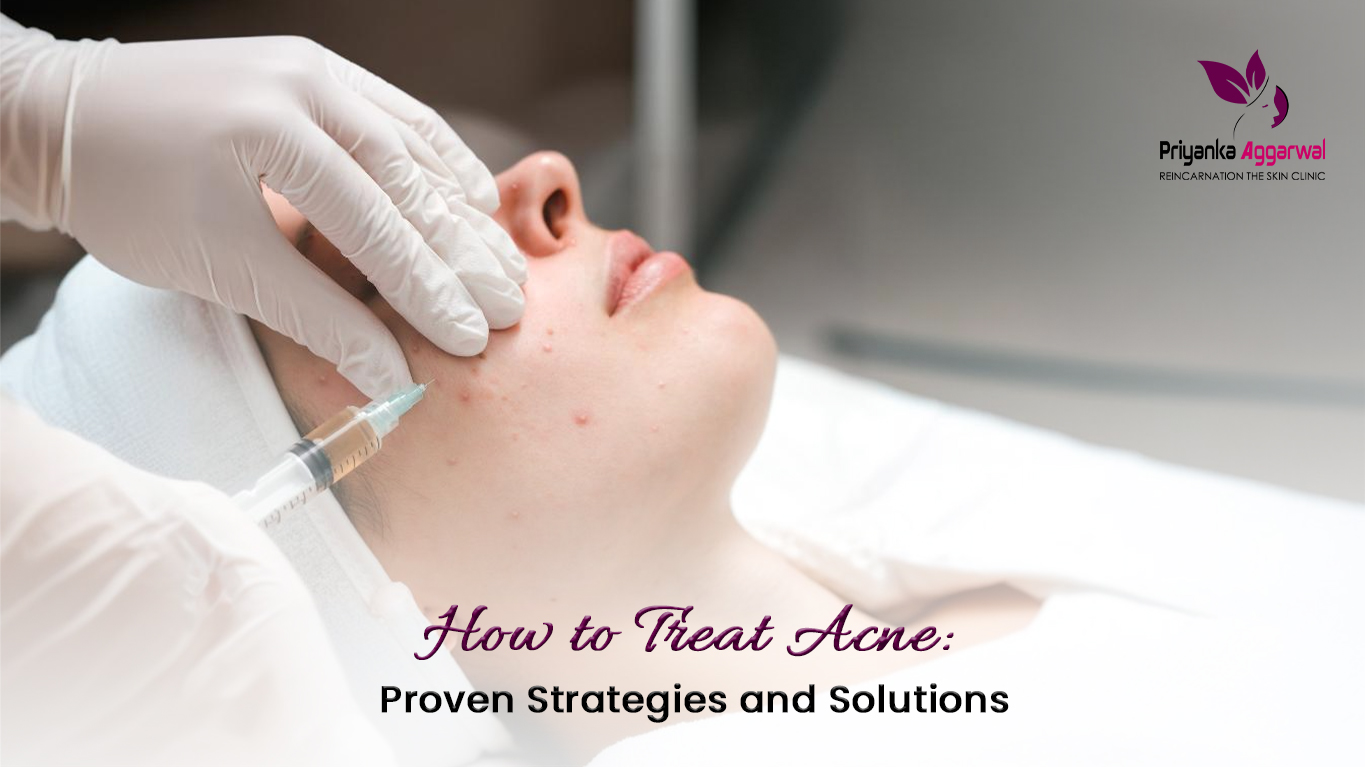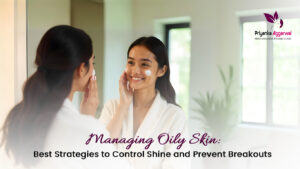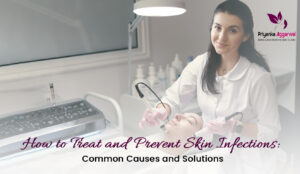Acne is one of the common skin diseases that cause inconvenience and emotional disturbance among millions of people around the globe. However, good acne treatments and strategies for managing and curing acne. It can occur to a person at any age; therefore, it does not matter what brings about the condition and how to treat it best. We will discuss what may cause acne, what is best for the treatment process, and how you can add healthy habits to reduce the breakout cycle. Let’s also see how expert care with Dr. Priyanka Aggarwal, Kolkata’s best skin specialist, might make a world of difference in acne treatment.
What Causes Acne?
Knowing what acne is will help someone fight it very effectively. Acne is caused by;
- Overproduction of the sebaceous glands: This excess may block pores with a high production of the same.
- Dead skin cells: These cells pile up inside the follicle and then block hair, providing the condition for the survival of acne.
- Bacteria: The bacteria termed Propionibacterium acnes thrive in the pores; hence, making the area red and swollen.
- Hormonal changes: Hormonal imbalance in general tends to cause acne during puberty, menstruation, pregnancy, or stress.
- Dietary and lifestyle habits: In general, the high sugar content of refined carbohydrates, oily food, less sleep, and continued stress trigger increased inflammation and sebum surges, worsening the case of acne.
Variants of Acne
Acne is not an illness but the general name given to several varieties.
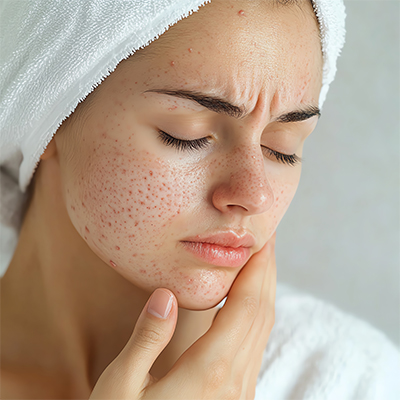
- Whiteheads and blackheads: Non-inflammatory acne; pores are blocked, with spots mainly appearing on the forehead, nose, and chin.
- Papules and pustules: Inflammatory acne; these are red, tender bumps or pus-filled pimples, which can easily scar if left untreated.
- Cysts and nodules: These painful types of acne occur deep beneath the skin, usually requiring professional acne treatment to avoid scarring.
- Untreated acne: Acne that is left untreated can cause irreversible scarring, dark spots, and even emotional stress, and you will lose your self-confidence. Thus, determination of the gravity and kind of your acne may guide you towards more effective remedies.
In this, it is important to identify the specific triggers associated with your particular skin type or lifestyle and proper management of acne following such identification. From the piece of information here, you get a chance to reduce outbreaks while heading in the right direction toward healthy-looking skin.
Build a Consistent Skincare Routine
A well-placed skincare routine will fight well against acne and maintain healthier-looking skin. Besides lessening the severity of a current breakout, it will help to maintain a healthy barrier that works to prevent new breakouts as well. Here is the simple plan for you:
Gently clean
Use a mild cleanser to softly wash the skin twice a day. Dirt, oil, and makeup do not remove the natural moisture from the skin. It has salicylic acid and benzoyl peroxide; therefore, it decreases acne. Hot water irritates the skin; pat your face dry with a clean towel.
Exfoliate once a week
Exfoliate to remove dead skin that blocks pores. The most effective chemical exfoliant has glycolic or lactic acid. Avoid over-exfoliating as harsh scrubs may irritate your skin, and over-exfoliating worsens the redness. For sensitive, exfoliate only once a week and not every day as too much exfoliating is bad for the skin.
Moisturize
Even oily skin still needs to be moisturized. Try a light, non-comedogenic moisturizer. A good moisturizer is also one that will complement the topical application for acne by preventing the use of topical acne treatment from becoming dry and irritated.
Sun Protection
Apply a sunscreen! Protect the skin from further darkening through acne scars. If your skin is oily or acne-prone, opt for a gel-based sunscreen or a mattifying product as it won’t cause clogging pores.
Avoid Over-Cleansing
While cleansing is crucial, overdoing it can strip the skin of its natural oils, leading to increased sebum production and more breakouts. Stick to cleansing twice a day unless you’ve been sweating excessively or wearing heavy makeup.
Patch-Test New Products
Well, let new products into your life starting from slow steps and doing patch tests to ensure that they will not irritate your skin or bring about allergic reactions, more so for sensitive skin and the use of active ingredients.
Consistency is the key to acne treatment. The routine, if adopted consistently, will eventually result in fewer breakouts and a better texture of the skin with increased confidence levels. If paired with proper guidance from professionals, such as Dr. Priyanka Aggarwal’s expertise, it is capable of bringing about a massive improvement.
Use Topical Acne Treatments
Topical acne treatments are very central in acne treatment. These directly address pimples and avoid their further occurrence altogether by promoting your skin’s texture and color. The right combination of active ingredients can be that saviour for your whole process of acne treatment.
Effective Ingredients to Look For:
- Kills bacteria, destroys bacteria- causes inflammation of acne, also eliminates infection.
- Salicylic Acid: This peels off the dead skin cells, opens pores, and minimizes blackheads and whiteheads.
- Retinoids (Adapalene or Tretinoin): These increase the turnover of skin cells and keep pores open and are also used for post-acne scarring.
- Niacinamide: It is an anti-inflammatory agent that can reduce redness and sebum oil production without drying the skin.
- Tea tree oil: it is an over-the-counter natural anti-inflammatory and antimicrobial agent that may be used for mild acne.
- Azelaic Acid: It kills the acne-promoting bacteria, reduces the inflammation, and fades up the hyper-pigmentation due to acne scars.
- Sulfur: It draws out all the excess oil, opens pores, and kills bacteria, making it suitable for sensitive skin.
- Alpha Hydroxy Acids: Glycolic or lactic acid causes exfoliation of the superficial layer of the skin, improves texture, and reduces acne scars.
How to Use Them:
- Begin with low doses to avoid irritation, especially if it is your first time using the active ingredients.
- It should be applied on affected areas and after washing should follow moisturizing application.
- Try to apply acne treatments at night because most active ingredients, especially retinoids, make your skin susceptible to sunlight.
- Always read the instructions on a new product. Introduce one product at a time and know how your skin will react. Use sunscreen daily on any product containing active ingredients since most of them enhance sun sensitivity.
Dr Priyanka Aggarwal will prescribe the best prescription topical acne treatment for your skin condition as well. The specific acne treatment plan is carried out specially formulated with an aim to cure and keep your skin healthy.
Lifestyle Changes to Prevent Acne Breakouts
These minor differences may be the distinction between completely healthy skin and better, treated acne over time. Even so, they will fortify your skincare routine because they work to target factors that cause flare-ups.
- Keep a healthy diet.
- All foods that should be taken with enough vitamins and antioxidants: are fruits, vegetables, lean proteins, and whole grains.
- Zinc, in addition to omega-3 fatty acids present in nuts, seeds, and fatty fish, decreases inflammation and improves skin health.
- Steer clear of high-glycemic foods like sugary snacks, white bread, and processed these foods elevate insulin levels and worsen acne.
- Stay Hydrated
- Drink at least 8-10 glasses of water to detoxify your body hydrating and bringing glow to your skin.
- Include hydrating foods in your diet such as cucumbers, watermelon, and oranges, to benefit more of your skin.
- Stress Management
- Stress increases cortisol levels, which can trigger excess oil production and inflammation, leading to breakouts.
- Engage in mindfulness, yoga, journaling, or meditation activities in daily life to maintain an emotional balance.
- Regular exercise, such as walking or swimming, decreases hormones of stress and promotes health at the skin level.
- Get Enough Sleep
- Sleep: Ideally, should sleep between 7-9 quality hours at night hence allowing the body to repair, rejuvenate, and regulate hormones.
- Keep a proper sleep schedule to reduce hormonal changes, which increase the likelihood of developing acne.
- Avoid fluid build-up resulting in puffiness and pimples by sleeping back with the head slightly raised.
- Keep it neat and clean
- Pillowcases and towels should be washed weekly. This could prevent the building of dirt, oil, and bacteria.
- Avoid touching your face with dirty hands in order not to add bacteria that could cause pores blockage.
- Clean frequently touched surfaces like your phone screen, headphones, or glasses regularly to prevent transferring bacteria to your skin.
- Wear less makeup
- Avoid comedogenic and oily cosmetics to eliminate pore clogging.
- Choose lighter, breathable formulas, as your skin must heal itself.
- Remove all makeup completely before sleeping. Double-cleanse when necessary to prevent any residue on your skin.
- No smoking, no alcohol
- It chokes the supply of oxygen to the skin and slows down the healing process.
- Alcohol dehydrates your skin and intensifies the inflammation. Avoiding these habits can lead to better and healthier-looking skin.
These small yet impactful lifestyle adjustments might seem minor, but they work in harmony with your skincare routine to prevent acne and maintain clear, radiant skin. By adopting these habits consistently, you’ll not only enhance your skin health but also promote overall well-being.
Seek Professional Treatment for Persistent Acne
If these over-the-counter products and lifestyle changes aren’t enough, then a dermatologist is in order. Advanced acne treatments include:
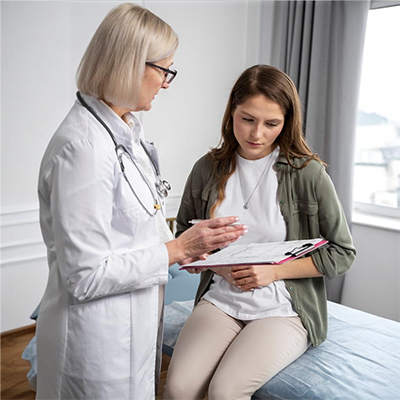
- Prescription drug
- Oral Antibiotics: Prevent bacterial proliferation and inflammation.
- Hormonal Therapies: It makes hormones return to normal for hormonal acne.
- Isotretinoin: A highly effective drug for severe, cystic acne.
- Out-patient procedure
- Chemical Peels: Remove the top dead layer and open the pores.
- Laser Therapy: Destroying acne-causing bacteria and reducing inflammation. Safely remove blackheads and whiteheads.
Dr. Priyanka Aggarwal brings you the latest acne treatments by skin type and concern. Your dermatologist will ensure that you receive adequate acne treatment.
Conclusion:
Acne is overwhelming, but some strategies make it manageable. First, know what acne is; then have a routine skincare routine, use proven topical acne treatments, implement lifestyle changes to prevent acne, and do not delay in getting professional help for those that persist.
Remember, the acne treatment is a means of achieving clear skin while boosting confidence and wellness. It takes patience and consistency because most results take some time and commitment.
If ever you require professional help with acne treatment, you do not have to think; instead, just consult Dr. Priyanka Aggarwal. She has more years of experience in practice and has better acne treatment available; she may thus guide you towards clearer skin. She even offers personal advice about how to keep your skin in check and not face too many breakouts.
Take back control of your skin today and earn yourself the confidence of healthy, good-looking skin.
Read more: The Science Behind Laser Skincare Treatments: How They Work and Their Benefits
FAQ
What are the main causes of acne?
There is acne, which is caused by to overproduction of oil, blocked pores, dead skin cells, and bacteria called Propionibacterium acnes. Besides this, stress, a poor diet, and some medicines are contributing factors to it.
When should I see a dermatologist for acne treatment?
Consult a dermatologist if acne persists despite over-the-counter treatments, causes scarring, or affects your self-confidence.
Can acne be treated with home remedies?
Mild cases may be amenable to treatment by over-the-counter preparations, such as tea tree oil, aloe vera, or honey, whose strength varies; more resistant forms will require medical intervention.

